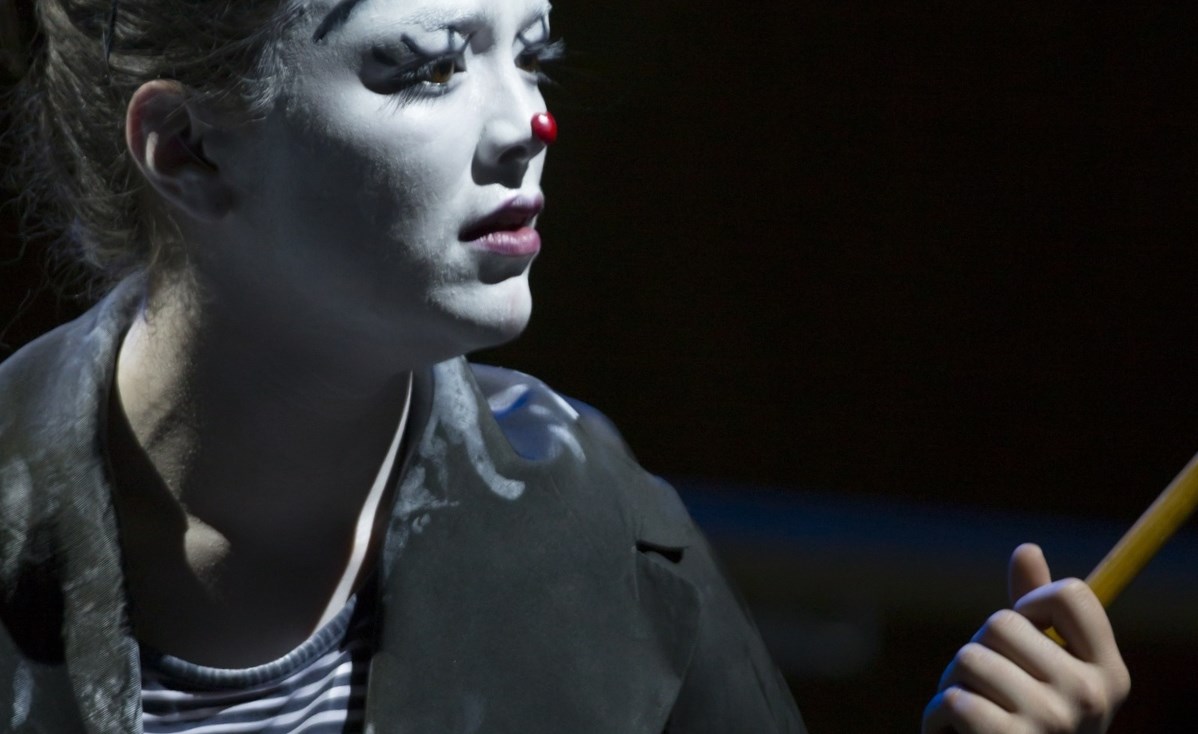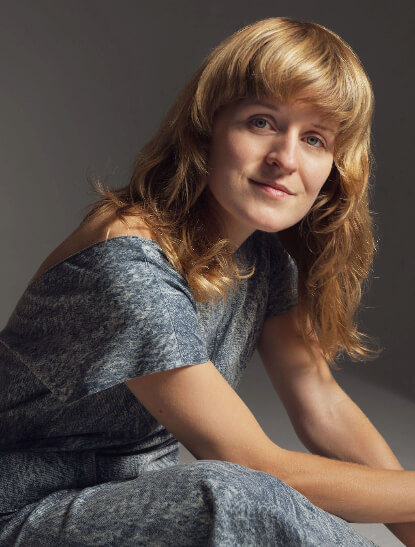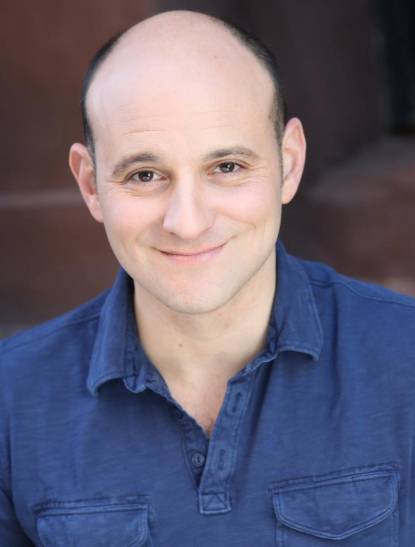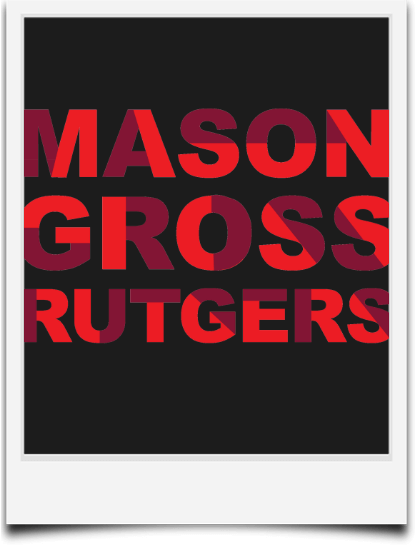
Theater
Online Courses
Rutgers Arts Online offers online courses on your schedule. Our list of Theater courses are taught by working artists who are experts in their field.
Matriculated students may take Rutgers Arts Online courses.
Non-matriculated students may take courses by filling out the Rutgers Arts Online Application.
Available Courses
07:965:222 Performing Solo: From Stage to YouTube Online
Performing Solo: From Stage to YouTube
Course Number: 07:965:222
Course Format: Lecture
Mode of Instruction: Online Asynchronous
This is a performance-based elective course designed for students of all disciplines who wish to persuasively communicate in person or on video. If you’re scared of public speaking, then this class is a great way to find your comfort zone, from the comfort of your own home. Students will try vlogging, stand-up, monologues, narration, and even multi-character dialogue, with the help of a supportive instructor and class. Students will study these formats through lectures and by watching videos. Students will have the freedom to write their own scripts on a variety of topics important to them. Performance experience is not required to take this course. These skills are not only used in entertainment, but also in video conferencing and marketing for any profession. No matter your major or future career, this course can help you be the person who is confident, comfortable, and stands out.
3 credits
Course Prerequisites and Corequisites: None
Learning Goals of Course:
Course Goal:
- Using theatrical performance language, students will learn to analyze the genre of solo performance in relation to the genre’s specific history and formats.
- Students will engage critically in the process of developing original creative solo performance material by writing in multiple solo performance styles and genres, as well as giving and receiving productive critiques.
- Students will develop communicative skills and self-awareness inherent in the process of performing their original work for the on-camera assignments.
Course Learning Objectives and Outcomes:
- The unit lectures combined with the unit quizzes will teach students the terminology, definitions, concepts, and methodology of the Solo Performance styles and genres.
- The performance video assignments will teach students how to verbally communicate, sort, and construct a personal speech, presentation, or performance.
- The unit discussion assignments will teach students to compare and solve issues and questions related to topical information.
- Giving and receiving classmate critiques on the video performances will teach students to sort and build their performance understanding and confidence.
- The writing assignments will teach students to write, identify, and construct their thoughts through written communication.
Policies for Exams, Assignments, Attendance, and Grading: ## Course Assignments
These are the types of assignments you will encounter in the course:
- Unit Lectures - lectures consist of reading the content and viewing the chosen videos within the lectures.
- Unit Quizzes - quizzes consist of multiple-choice questions based on the content of the lectures.
- Unit Video Assignments - the videos will be performed, recorded, edited, and uploaded by the students.
- Each video will be seen by the instructor and fellow students. Constructive criticism will be given. The Final
- Presentation assignment is a video assignment.
- Unit Discussion Assignments - discussion topics will be given to the class and students will be asked to respond to the topic and each other in an online forum.
- Unit Video Critiques - constructive criticism on fellow students' video assignments.
- Unit Writing Assignments - creative writing assignments that are designed to help the students choose their final presentation topic and solo performance style.
Course Grading
Final Grade Percentages
- Writing Assignments (5 total) 15%
- Performance Video Assignments excluding Final (6 total) 30%
- Unit Quizzes (4 total) 8%
- Discussions (5 total) 10%
- Presentation Pitch Research Paper (1 total) 5%
- Critique of Classmates (6 total) 12%
- Final Performance Presentation (1 total) 20%
- TOTAL 100%
Instructor: Raymond McAnally, raymonmc@mgsa.rutgers.edu
07:965:225 Building Characters: From Animation Voiceover to Live-Action Online
Building Characters: From Animation Voiceover to Live-Action Online
Course Number: 07:965:225
Course Format: Lecture
Mode of Instruction: Online Asynchronous
This is a performance-based elective course designed for students of all disciplines who wish to persuasively communicate in person or on video. If you’re scared of public speaking, then this class is a great way to find your comfort zone, from the comfort of your own home. Students will try vlogging, stand-up, monologues, narration, and even multi-character dialogue, with the help of a supportive instructor and class. Students will study these formats through lectures and by watching videos. Students will have the freedom to write their own scripts on a variety of topics important to them. Performance experience is not required to take this course. These skills are not only used in entertainment, but also in video conferencing and marketing for any profession. No matter your major or future career, this course can help you be the person who is confident, comfortable, and stands out.
3 credits
Course Prerequisites and Corequisites: None
Learning Goals of Course: The goal of this course is to analyze the craft of acting in relation to specific techniques and disciplines, in order to engage critically in the process of developing original characters and creative performance material. Each student will experience the benefits of creating, writing, and performing their character work on camera, as well as giving and receiving productive critiques.
The communicative skills, behavioral study, empathy, and self-awareness learned herein will aid students in their individual fields of study and future careers. The class will focus on critical analysis of performance, artistic research of human behavior, and the ability to express one’s thoughts coherently through both verbal and written communication skills.
Objectives
- Using theatrical performance language, students will learn to analyze a variety of acting techniques, in relation to the technique’s specific history and purpose for exploring characters.
- Students will engage critically in the process of developing original creative performance material by writing and performing various acting techniques to create new characters, as well as giving and receiving productive critiques.
- Students will develop communicative skills and self-awareness inherent in the process of performing their original work for the on-camera assignments.
Learning Outcomes
After participating in this course, the student will be able to:
- Understand and utilize the terminology, definitions, concepts, and methodology of the acting techniques covered in the Unit Lectures and reinforced by the Unit Quizzes.
- Verbally communicate, sort, and construct a personal speech, presentation, or performance as learned through their experience preparing for the video assignments.
- Compare and solve issues and questions related to topical information as learned through Unit Discussion assignments.
- Sort and build their performance understanding and confidence by giving and receiving constructive Classmate Critiques for the course video assignments.
- Write, identify, and construct their thoughts through writing assignments.
Policies for Exams, Assignments, Attendance, and Grading:
Course Assignments
These are the types of assignments you will encounter in the course:
- Unit Lectures - lectures consist of reading the content and viewing the chosen videos within the lectures.
- Unit Quizzes - quizzes consist of multiple-choice questions based on the content of the lectures.
- Unit Video Assignments - the videos will be performed, recorded, edited, and uploaded by the students. Each video will be seen by the instructor and fellow students. Constructive criticism will be given. The Final Presentation assignment is a video assignment.
- Unit Discussion Assignments - discussion topics will be given to the class and students will be asked to respond to the topic and each other in an online forum.
- Unit Video Critiques - constructive criticism on fellow students' video assignments.
- Unit Writing Assignments - creative writing assignments that are designed to help the students choose their final presentation topic and solo performance style.
Course Grading
Final Grade Percentages
- Writing Assignments (5 total)15%
- Performance Video Assignments excluding Final (6 total) 30%
- Unit Quizzes (4 total) 8%
- Discussions (5 total) 10%
- Character Research Paper (1 total) 5%
- Critique of Classmates (6 total) 12%
- Final Performance Presentation (1 total) 20%
- TOTAL 100%
Instructor: Raymond McAnally, raymonmc@mgsa.rutgers.edu
07:965:230 Theater Appreciation Online
Students attend a wide spectrum of theater offerings including Broadway, off-Broadway, off-off-Broadway, regional, educational, and community events, and, through viewing those theatrical productions and online lectures, gain an appreciation of performance and everything that goes into producing theater.
3 Credits
Note: Students will not receive credit for both 07:965:230 and 07:965:211. This course does not fulfill any SAS core requirements.
Instructors:
Richie Call, rcall@mgsa.rutgers.edu
Raymond Mcanally, rmcanally@mgsa.rutgers.edu
Antu Yacob, ayacob@mgsa.rutgers.edu
STUDENTS MAY NOT RECEIVE CREDIT FOR BOTH THEATER APPRECIATION 07:965:211 AND THEATER APPRECIATION ONLINE 07:965:230; THEATER APPRECIATION 07:965:211 MAY BE TAKEN FOR SAS CORE; THEATER APPRECIATION ONLINE 07:965:230 DOES NOT FULFILL ANY SAS CORE REQUIREMENT
07:965:231 Theater History I Online
Theater History I Online
Course Number: 07:965:231
Course Format: Lecture
Mode of Instruction: Online Asynchronous
The objective is to examine the traditions of primarily Western theater from its origins to the English Restoration, within the context of wider cultural and political developments.
The class focuses on the relationship of these dramatic traditions to current issues such as gender, race, power, and identity, as well as theater as a vital expression of universal human empathy.
3 credits
Course Prerequisites and Corequisites: None
Learning Goals of Course:
Learning Objectives
- Analyze the relationship of theater to ritual, ceremony, and performance in everyday life;
- Compare, contrast, and interrogate theater/performance traditions through such lenses as race, gender, class, and colonialism, with a particular emphasis on centering traditionally marginalized/ignored/oppressed voices;
- Identify shifting historical approaches to theater production and performance;
- Distinguish between different dramatic genres and styles, and identify their historical evolution.
Learning Outcomes
- Construct coherent, analytical, critical written arguments that synthesize course concepts;
- Demonstrate close engagement with course readings and comprehension of course concepts and facts;
- Critically and creatively engage with other students via select assignments.
Policies for Exams, Assignments, Attendance, and Grading:
Course Assignments
Over the semester, the student will submit:
- One video introduction
- Eleven weekly open-book quizzes on the readings (lecture plus any additional readings)
- One Visual Connections assignment
- One closed-book Overview Exam
- One Life Connections Assignment
Note: There are NO extra-credit assignments for this class.
Course Grading
Note: Please see the Assessment Rubrics page in the Course Essentials modules for further details.
Final Grade Calculation (Assignment Percentage)
- Life Connections 40%
- Overview Exam 25%
- Weekly Quizzes (11 total) 30% (2.72% each)
- Visual Connections 4%
- Introduction Video 1%
Instructors:
David Letwin, dpletwin@mgsa.rutgers.edu
Kate Douglas, kate.douglas@rutgers.edu
STUDENTS MAY NOT RECEIVE CREDIT FOR BOTH THEATER HISTORY I ONLINE 07:965:231 AND THEATER HISTORY I 07:965:281
07:965:232 Theater History II Online
Theater History II Online
Course Number: 07:965:232
Course Format: Lecture
Mode of Instruction: Online Asynchronous
Theater II picks up where the first class leaves off and takes us to the present time.
A survey of key theater developments, concepts, and trends, primarily Western, from the 18th Century to the present, within the broader context of emergent modernity, the crises this radical change produced, and the range of artistic responses to this new — and destabilizing — reality.
3 credits
Course Prerequisites and Corequisites: None
Learning Goals of Course:
Learning Objectives
- Analyze the relationship of theater to ritual, ceremony, and performance in everyday life;
- Compare, contrast, and interrogate theater/performance traditions through such lenses as race, gender, class, modernity, and colonialism, with a particular emphasis on centering traditionally marginalized/ignored/oppressed voices;
- Identify shifting historical approaches to theater production and performance;
- Distinguish between different dramatic genres and styles, and identify their historical evolution.
Learning Outcomes
- Construct coherent, analytical, critical written arguments that synthesize course concepts;
- Demonstrate close engagement with course readings and comprehension of course concepts and facts;
- Critically and creatively engage with other students via select assignments.
Required and Recommended Course Materials: In addition to what is already posted on the Canvas course site (weekly lectures and links to some of the plays), you will need to pick up one book and several plays that are not in the public domain. Please see the “Weekly Supplemental Readings List” page in the “Course Essentials” module for details.
Policies for Exams, Assignments, Attendance, and Grading:
Course Assignments
Over the semester, the student will:
- One video introduction
- Eleven weekly open-book quizzes on the readings (lecture plus any additional readings)
- One Visual Connection assignment
- Two discussions assignments
- One closed-book Overview Exam
- One Blog/Paper Assignment
Note: There are NO extra-credit assignments for this class.
Grading
Note: Please see the Assessment Rubrics page in the Course Essentials modules for further details.
Final Course Grade Calculation (Assignment Percentage)
- Blog/Paper 30%
- Discussion Threads (2 total) 30% (15% each)
- Overview Exam 21%
- Weekly Quizzes (11 total) 15% (1.36% each)
- Visual Connection 3%
- Introduction Video 1%
Instructor: David Letwin, dpletwin@mgsa.rutgers.edu
STUDENTS MAY NOT RECEIVE CREDIT FOR BOTH THEATER HISTORY II ONLINE 07:965:232 AND THEATER HISTORY II 07:965:282
07:965:235 Social Drama: Reentry as a Rite of Passage Online
Social Drama: Reentry as a Rite of Passage Online
Course Number: 07:965:235
Course Format: Lecture
Mode of Instruction: Online Asynchronous
Social Drama: Reentry as a Rite of Passage is a 7-week, 2-credit short course that introduces students to an under-researched and underappreciated body of sociological and criminological literature — and emerging praxes — that, taken together, suggest the centrality of ritual in supporting people through the process of reentering society after serving time in prison — a process known as “reentry.” It also recalls Western theater’s roots in both ritual and in civic life, and points to contemporary roles for art and for the artist that extend far beyond commerce and entertainment.
In this course, students will engage with ideas and practices from such disparate realms as traditional and community-based theater, ritual studies, narrative studies, trauma studies, and criminology. Students will consider the U.S.-based criminal justice system as one in which the social “performance” of punishment is as central as the actual sanctions imposed upon individuals.
Students will be able to identify the overall from and constituent components of rites of passage and understand the connections, historically and aesthetically, between ritual and Western theater. Students will know the four broad eras of American punishment, from colonial times to today. And they will consider what it means to “come home” in the context of the social factors that often lead to incarceration, the realities of daily life inside prisons, and the internal and external challenges of leaving prison. The culminating assignment will have students using what they’ve learned in class to create three images that “describe” three key aspects of an imagined homecoming ritual for returning citizens. The descriptions will then be used to generate AI images of the students’ rituals..
2 credit(s)
Course Prerequisites and Corequisites: None
Learning Goals of Course:
- Identify and explain the aesthetic and social characteristics of, distinctions between, and functions inherent to ceremonies, routines, rituals, rites of passage, and theatrical performance.
- Understand the concepts of the “aesthetic and sensory variable,” Michael Chekhov’s “psychological gesture,” and Rancière’s “distribution of the sensible” to identify and analyze external and internal aspects of theatrical performance as well as those that comprise the many “social dramas” that are performed within the U.S. criminal-legal system
- Describe 4 major phases of punishment in what is now the United States, from Colonial America to today and reflect critically on the criminal-legal system, specifically regarding how race, class, power, and privilege have informed the “performance” of punishment by, to, and upon different kinds of social actors.
- Conceptualize, design, and justify — in formal and theoretical terms — a theatrical rite of passage intended to welcome returning citizens back into the community following incarceration.
07:965:240 Staging Resistance: Theater, Protest, and Social Change Online
Staging Resistance: Theater, Protest, and Social Change Online
Course Number: 07:965:240
Course Format: Lecture
Mode of Instruction: Online Asynchronous
Through plays and other performance texts, videos, graphics, media accounts, and critical theory readings, this class will explore the vibrant tradition of the atricalized or staged resistance to the injustice and inequality endemic to contemporary culture. Sources include: plays and films that explicitly challenge embedded power hierarchies; radical performative disruptions such as Pussy Riot, Occupy Wall Street, and Take a Knee protests; and participatory community-engaged theater for social change.
3 credits
Course Prerequisites and Corequisites: None
Learning Goals of Course: This course is based on the principle of “Dual-Purpose Content,” in which the curriculum a) facilitates the acquisition of discipline-specific knowledge, and b) serves to develop critical, analytical, and creative thinking.
Learning Objectives
- Identify the historical development of “staged resistance,” beginning with the first-wave European avant-garde movements of the late nineteenth/early twentieth century, through to the present
- Identify how class, race, gender, nationality, sexuality — among other identity markers — intersect with “staged resistance.”
- Analyze the ways in which “staged resistance” overlaps with and breaks from the aesthetics/techniques of traditional theater.
Learning Outcomes
- Construct coherent, analytical, critical written arguments that synthesize course concepts.
- Demonstrate close engagement with course readings and comprehension of course concepts and facts.
- Critically, analytically, and creatively engage with other students via discussions assignments based on course material.
- Incorporate course concepts into creative final project.
Policies for Exams, Assignments, Attendance, and Grading:
Course Structure and Assignments
Note: Assignments subject to change
The course is organized around weekly modules/case studies. Over the semester, the student will:
- One video introduction
- Eleven weekly open-book quizzes on the readings (lecture plus any additional readings)
- Two Visual Connection assignments
- Two discussions assignments
- One closed-book Final Exam
- One Blog Assignment
Final Grade Calculation
- Blog Project 30%
- Discussion Threads (2 total) 32% (16% each)
- Final Exam 21%
- Weekly Quizzes (11 total) 16% (1.45% each)
- Introduction Video 1%
Instructor: David Letwin, dpletwin@mgsa.rutgers.edu







